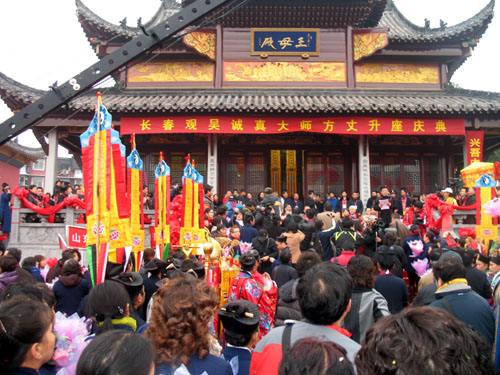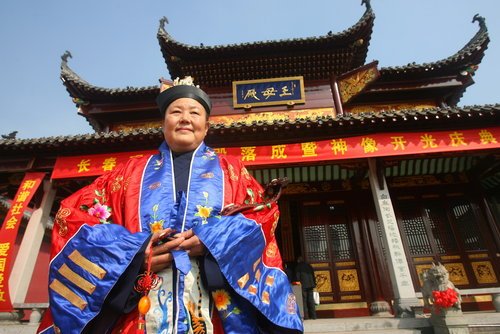Daoists appoint first ever female abbot
"Now anything is possible, right?" Wu Chengzhen told China.org.cn. The 52-year-old native of Wuhan became the first female abbot in the 1,800-year history of Daoism on Sunday when she was appointed abbot of the city's Changchun Daoist Temple.
|
|
|
Wu Chengzhen, the first female abbot of Daoism |
An inauguration ceremony, attended by more than 1000 Daoists from as far away as France and Egypt, was held in the newly-finished Wangmu (Queen Mother of the Western Heavens) Hall of the Changchun Temple in Wuhan, Hubei Province.
The selection of a Daoist abbot, the highest rank in the religion, is very strict and requires the candidates to practice self-discipline and maintain a good reputation. In Wu Chengzhen's case, her appointment was ratified by a vote of all the Daoists in the temple.
"I'm grateful I have been chosen to do the job," Wu told China.org.cn, "but I see it as part of the greater Daoist practice. I am doing this for my fellow Daoists. I'm not after power, money or fame. None of those have anything to do with my Daoist spiritual journey."
|
|
|
An inauguration ceremony, attended by more than 1000 Daoists from as far away as France and Egypt, was held in the newly-finished Wangmu Hall of the Changchun Temple in Wuhan, Hubei Province, November 15, 2009. [China.org.cn] |
But in fact, one of Wu's major worries is money. The Chinese government does not financially support Daoism except for the conservation of cultural relics and cultural promotion, so Daoists have to finance themselves by gathering donations from their followers in society.
The 9th Daoist Music Concert, an annual gathering to showcase the musical riches of Daoism, was held on Saturday. The production cost 80,000 yuan (US$11,718) to stage. Changchun Daoist Temple had to fork out the money to pay the bills, Wu said, but the donations they collected to finance the event were very small and they did not sell tickets to the public.
"One of my constant tasks is to find new ways of making money and appealing for donations," said Wu. "But I believe anything is possible now after being appointed abbot – something I had never dreamed of as a woman."
But when asked if she was likely to adopt the approach of Shaolin Temple abbot Shi Yongxin, who commercialized the Shaolin “brand" domestically and internationally – in the process stirring up a huge controversy, Wu cautiously refused to comment but vowed she would not let things go too far.
Maintaining her previous simple lifestyle, Wu Chengzhen still lives in a small room with her sister. It is reported she has over 10,000 disciples, from university professors and entrepreneurs to farmers. Between them they annually donate at least 2 million yuan (US$292,920) to her, but Wu transfers all the money directly into the construction fund of the temple.
"She demands that every cent is recorded," a temple official told.
 |
|
An inauguration ceremony, attended by more than 1000 Daoists from as far away as France and Egypt, was held in the newly-finished Wangmu Hall of the Changchun Temple in Wuhan, Hubei Province, November 15, 2009. [China.org.cn] |
Changchun Daoist Temple, located on Shuangfeng Mountain in Wuhan, is one of the most famous Daoist centers in China. It is named after Qiu Chuji, a Yuan Dynasty (1271 -1368) Daoist who became known as the Immortal Changchun. It has seen several major renovations since Wu has took charge of its administration.
Wu, who became a Daoist in 1984, is director of Hubei Daoist Association. She is well known for her charitable work, and since 2000 has collected more than 4 million yuan (US$585,859) for distribution to the poor and as aid to victims of disasters such as the Sichuan earthquake. She has also visited Europe and Southeast Asia on cultural exchange visits.
A fellow abbot from Wudang Mountain in Hubei Province said Wu is a very modest person who is very popular with the public.
For the future, Wu told China.org.cn that she has several plans at hand, including building a Daoism museum, a Daoist medicine center, and a Daoist consultation house, to promote China's traditional Daoist culture, which, she believes, is a source of oriental wisdom that can help solve major world problems such as war and pollution. Wu said she hopes to complete these projects in the next 10 years.
 0 Comments
0 Comments









Comments